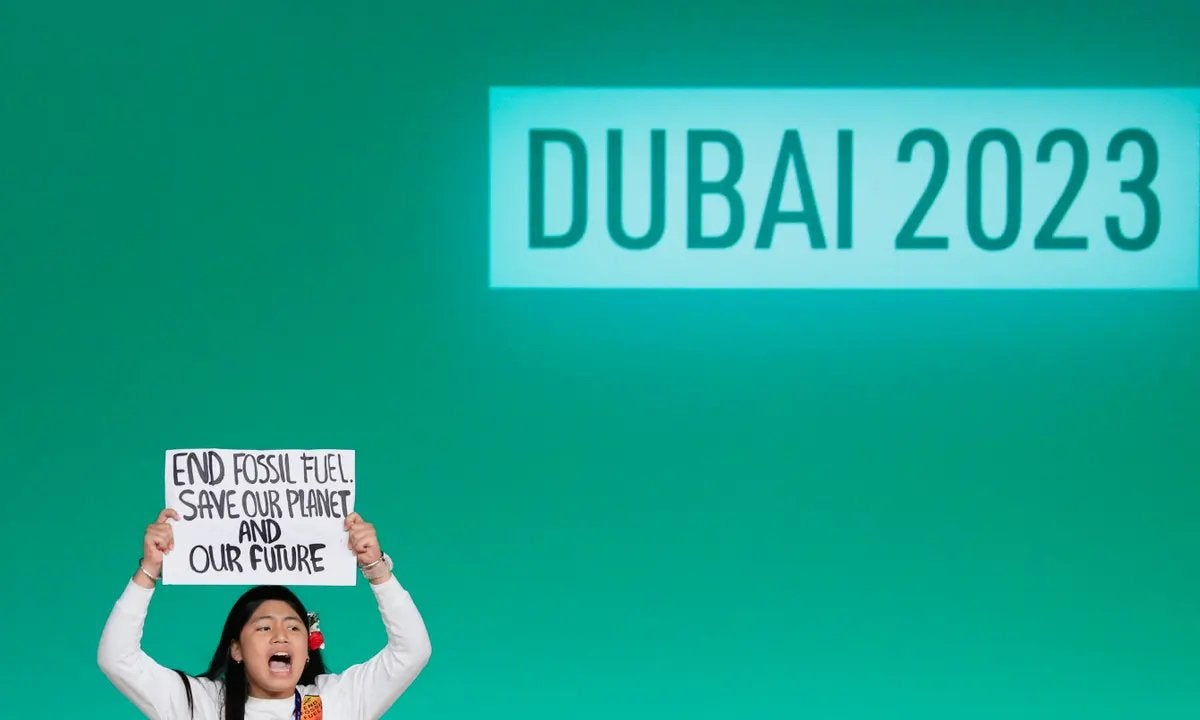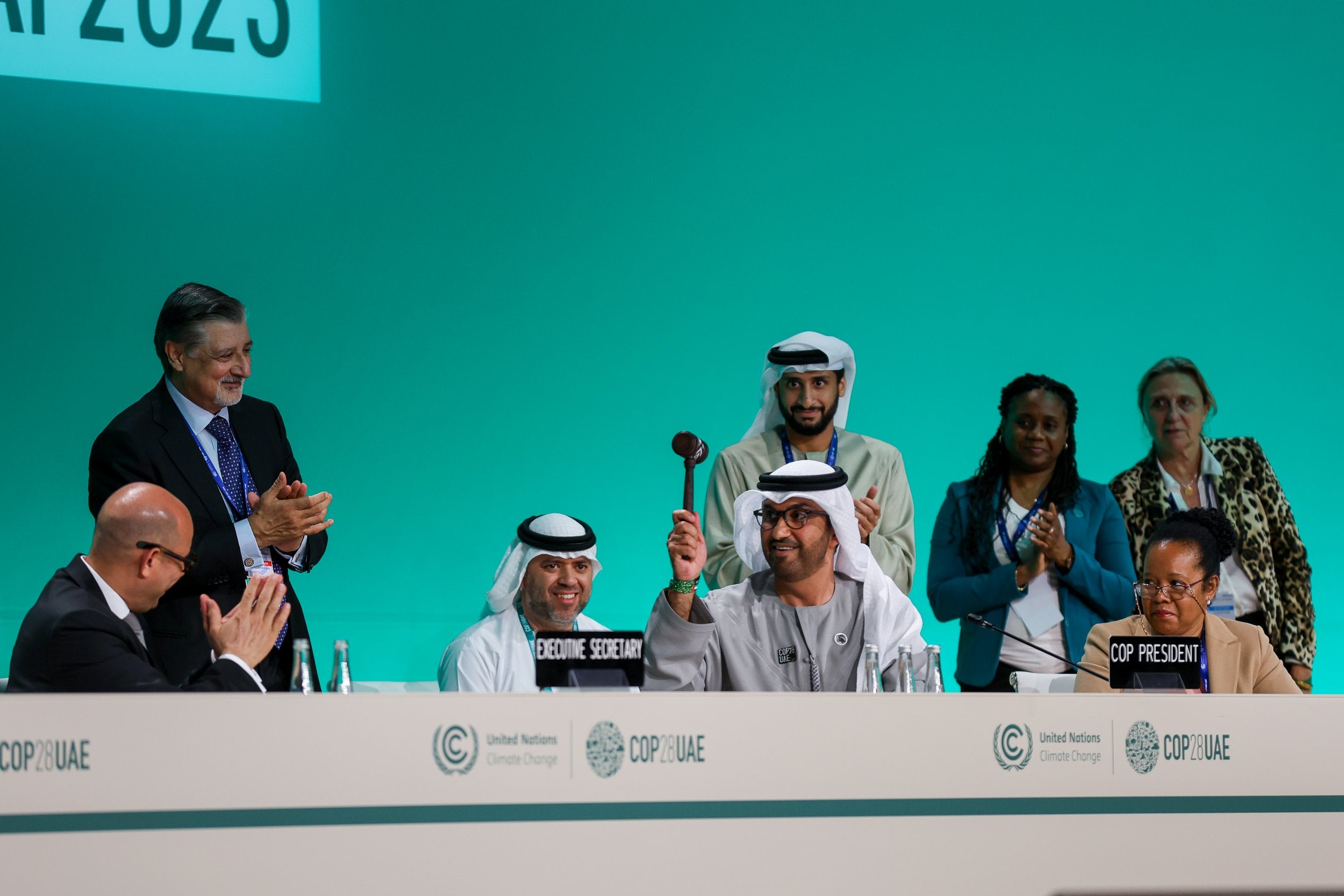Taking Stock of COP28

The second week of any COP is all about the landing the ‘final text’. And this year the focus of the text is on the first ‘Global Stocktake’.
What is the ‘Global Stocktake’? This is a thorough assessment of how much progress countries are making toward the Paris Agreement targets – limiting global warming to below 2°C and ideally to 1.5°C compared to the levels in the pre-industrial era (1850–1900) and how ambitions can be ‘ratcheted up’.
So what made it on the ‘final text’? And what else happened in week 2 of COP28?
Here are the top 4 things you should know:
1. ‘Transition away’ from fossil fuels
Speaking at COP28, António Guterres, UN Secretary-General, said, “The science is clear: The 1.5C limit is only possible if we ultimately stop burning all fossil fuels. Not reduce, not abate. Phase out, with a clear timeframe.”
Earlier in COP28, the draft text mentioned a ‘phase out’ of fossil fuels which was a huge moment. But after final negotiations, this was amended to ‘transition away’.
Global Stocktake text:
Transition away from fossil fuels in energy systems in a just, orderly and equitable manner, accelerating action in this critical decade, so as to achieve net zero by 2050 in keeping with the science.
So what does this mean?
A transition, well yes, that’s pretty obvious. But it is a question of how much and by when – that’s what matters. In the final text, the main target is 2050.
Whilst some are disappointed with the final text, many are celebrating this as a win. It is the first time that ‘fossil fuels’ have been called out in a UN climate change agreement, after 28 years of international climate negotiations.

Licypriya Kangujam, an Indigenous climate activist from India, holds a banner during COP28. Credit: Thomas Mukoya, Reuters.
2. Food system transformation
Our food system is clearly linked to the nature and climate crisis. Yet, it is only at this COP that the UN has established a global roadmap to align climate action with how our food system operates. Alongside this, countries are recognising the immediate need to strengthen the resilience of their food systems to the climate crisis.
Transformation seems to the word most strongly associated to food systems at COP28:
- The Call to Action for Transforming Food Systems for People, Nature and Climate was signed by 200 non-state actors.
- The Transforming Urban Rural Food Systems (TURFS) Consortium launched its Strategy for Food Systems Transformation to empower and support cities.
- The FAST (Food and Agriculture for Sustainable Transformation) Initiative held its inception meeting.
3. The Freshwater Challenge
One critical biome that demands radical transformation is freshwater. Our rivers, streams, lakes, have all seen species decline faster than any other ecosystem in the last 50 years. MSQ/Sustain’s work with The Nature Conservancy opened our eyes to this (launching soon!).
We applaud the thirty-three countries that signed up to The Freshwater Challenge at COP28. It aims to restore 300,000km of degraded rivers and 350 million hectares of degraded wetlands by 2030, as well as conserve intact freshwater ecosystems.
4. Nature and business
MSQ/Sustain helped launch the Science-based Targets for Nature with the Global Commons Alliance (GCA) in 2022. And at COP28, GCA were involved in releasing the Climate and Nature Action – Resource Navigator for Companies and Financial Institutions. The guide enables companies to select and apply the tools to tackle carbon emissions and implement nature-based solutions, that are most relevant to their business operations and stakeholders.
Building on this, as the Nature Positive movement gathers pace, WWF published a new report to bring climate plans and biodiversity strategy together. Meanwhile, the International Fund for Animal Welfare published a report highlighting the role of wildlife conservation in addressing the climate crisis.
Increasingly climate and nature are being integrated into every major international summit (and so it should be).
What's Next Then?
Next stop is Davos in January 2024 and the G20 Summit in November 2024. More conversations to be had and, hopefully, more action for our planet.

Sultan Al Jaber, COP 28 President and Minister of Industry and Advanced Technology, UAE, declared COP28 adjourned at 5:11 pm on 13 December. Credit: IISD/ENB|Mike Muzurakis.
Further reading



